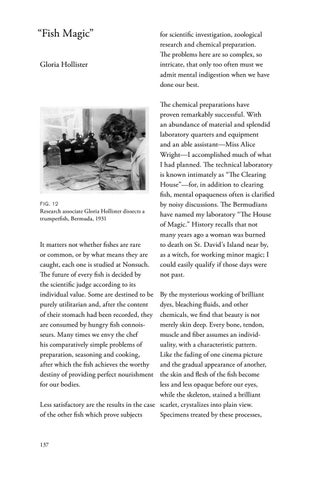“Fish Magic” Gloria Hollister
FIG . 12
Research associate Gloria Hollister dissects a trumpetfish, Bermuda, 1931
It matters not whether fishes are rare or common, or by what means they are caught, each one is studied at Nonsuch. The future of every fish is decided by the scientific judge according to its individual value. Some are destined to be purely utilitarian and, after the content of their stomach had been recorded, they are consumed by hungry fish connoisseurs. Many times we envy the chef his comparatively simple problems of preparation, seasoning and cooking, after which the fish achieves the worthy destiny of providing perfect nourishment for our bodies.
for scientific investigation, zoological research and chemical preparation. The problems here are so complex, so intricate, that only too often must we admit mental indigestion when we have done our best. The chemical preparations have proven remarkably successful. With an abundance of material and splendid laboratory quarters and equipment and an able assistant—Miss Alice Wright—I accomplished much of what I had planned. The technical laboratory is known intimately as “The Clearing House”—for, in addition to clearing fish, mental opaqueness often is clarified by noisy discussions. The Bermudians have named my laboratory “The House of Magic.” History recalls that not many years ago a woman was burned to death on St. David’s Island near by, as a witch, for working minor magic; I could easily qualify if those days were not past.
By the mysterious working of brilliant dyes, bleaching fluids, and other chemicals, we find that beauty is not merely skin deep. Every bone, tendon, muscle and fiber assumes an individuality, with a characteristic pattern. Like the fading of one cinema picture and the gradual appearance of another, the skin and flesh of the fish become less and less opaque before our eyes, while the skeleton, stained a brilliant Less satisfactory are the results in the case scarlet, crystalizes into plain view. of the other fish which prove subjects Specimens treated by these processes,
137
